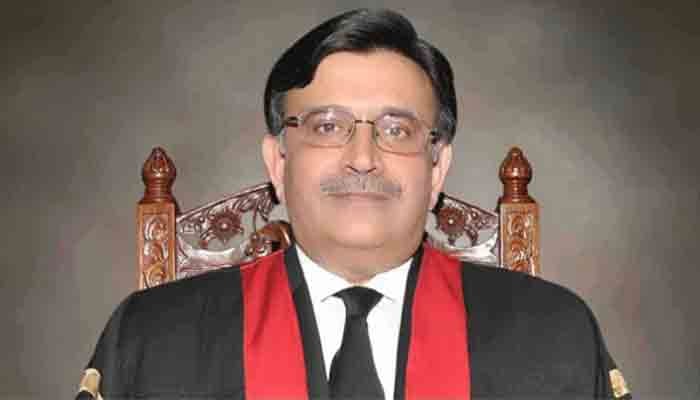Will have to work towards mature democracy: CJP Umar Ata Bandial
The CJP observed that the votes of the dissidents should not be counted to ensure national interest and to end the scourge of shifting loyalties
ISLAMABAD: Chief Justice of Pakistan (CJP) Umar Ata Bandial Friday said that the country would have to be taken towards a "mature democracy”.
The remark came during the hearing of the presidential reference seeking the interpretation of Article 63(A) of the Constitution. Supreme Court's larger bench — headed by CJP Bandial and comprising Justice Muneeb Akhtar, Justice Ijazul Ahsan, Justice Mazhar Alam, and Justice Jamal Khan Mandokhel — was hearing the reference.
"We have to take the country towards mature democracy and for that, it is necessary for the legislators to have a fruitful discussion," CJP Bandial remarked. He observed that the votes of the dissidents should not be counted to ensure national interest and to end the scourge of shifting loyalties. "Court's job is to answer all constitutional questions," he said, asking if the court is bound to answer according to the words stated in the reference or can it interpret otherwise.
Justice Mandokhel, while addressing PTI's lawyer Advocate Ali Zafar, said that political parties should treat "this cancer" on their own if they have any inconvenience because of it. "Only one political party is against dissidents. We have the majority of political parties that oppose your [PTI's] stance," Justice Mandokhel remarked. He asked if the PTI expects the court to rule in its favour while ignoring the majority's opinion.
Justice Muneeb Akhter, however, was of the view that the only graceful way for the deviant member was to resign and go home. He was responding to PMLN counsel Makhdoom Ali Khan’s argument that disloyalty to the party was different from disloyalty to the state.
Justice Mandokhel observed that according to Article 63A, a dissident lawmaker could cast his vote but he would subsequently lose his seat. Justice Miankhel observed that the party head could only give a declaration after the vote had been cast, adding that the party chief could inform the speaker even while polling was going on.
Justice Mandokhel pointed out that after the vote had been cast the party chief would first issue a show-cause notice and seek the dissident member’s reply.
-
 Jennifer Aniston Already Decided Her Wedding Dress?
Jennifer Aniston Already Decided Her Wedding Dress? -
 Prince Harry, Meghan’s Hollywood Party Drama Exposes Chaotic PR Strategy
Prince Harry, Meghan’s Hollywood Party Drama Exposes Chaotic PR Strategy -
 Jennifer Garner Reacts To Savannah Guthrie's Video As Search For Nancy Guthrie Continues
Jennifer Garner Reacts To Savannah Guthrie's Video As Search For Nancy Guthrie Continues -
 Bad Bunny Leaves Fans Worried With Major Move After Super Bowl Halftime Show
Bad Bunny Leaves Fans Worried With Major Move After Super Bowl Halftime Show -
 Captain Jason Talks Personal Hardships He Faced Ahead Of 'Below Deck' Season 4
Captain Jason Talks Personal Hardships He Faced Ahead Of 'Below Deck' Season 4 -
 Anti-monarchy Group Reacts To Prince William, Kate Middleton Statement On Epstein Scandal
Anti-monarchy Group Reacts To Prince William, Kate Middleton Statement On Epstein Scandal -
 Andrew 'must' Apologize Not Wider Royal Family For Jeffrey Epstein Links
Andrew 'must' Apologize Not Wider Royal Family For Jeffrey Epstein Links -
 Super Bowl 2026: Why Didn't Epstein Survivors Ad Air On TV?
Super Bowl 2026: Why Didn't Epstein Survivors Ad Air On TV? -
 'Harry Potter' TV Series Exec Teases 'biggest Event In Streaming': Deets
'Harry Potter' TV Series Exec Teases 'biggest Event In Streaming': Deets -
 Camila Mendes Finally Reveals Wedding Plans With Fiancé Rudy Mancuso
Camila Mendes Finally Reveals Wedding Plans With Fiancé Rudy Mancuso -
 Beatrice, Eugenie Blindsided By Extent Of Sarah Ferguson’s Epstein Links
Beatrice, Eugenie Blindsided By Extent Of Sarah Ferguson’s Epstein Links -
 Girl And Grandfather Attacked In Knife Assault Outside Los Angeles Home
Girl And Grandfather Attacked In Knife Assault Outside Los Angeles Home -
 Super Bowl Halftime Show 2026: What Did Trump Say About Bad Bunny?
Super Bowl Halftime Show 2026: What Did Trump Say About Bad Bunny? -
 Piers Morgan Defends Bad Bunny's Super Bowl Performance, Disagrees With Trump Remarks
Piers Morgan Defends Bad Bunny's Super Bowl Performance, Disagrees With Trump Remarks -
 Andrew Lands In New Trouble Days After Royal Lodge Eviction
Andrew Lands In New Trouble Days After Royal Lodge Eviction -
 Instagram, YouTube Addiction Case Trial Kicks Off In California
Instagram, YouTube Addiction Case Trial Kicks Off In California




